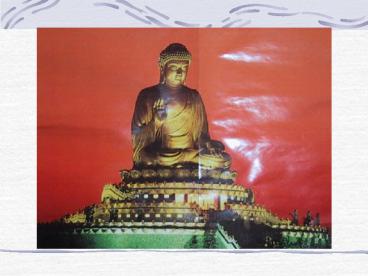Buddhism - PowerPoint PPT Presentation
1 / 22
Title:
Buddhism
Description:
Siddhartha Gautama, who became the Buddha, was born into the warrior caste. ... diseased man, a corpse, and a mendicant), caught his attention and disturbed him. ... – PowerPoint PPT presentation
Number of Views:180
Avg rating:3.0/5.0
Title: Buddhism
1
(No Transcript)
2
Buddhism
- A Therapy for Living from One Who Woke Up
3
The Life of Gautama
User
- Siddhartha Gautama, who became the Buddha, was
born into the warrior caste . His father ruled
over a small region of northern India. - Siddhartha led a pampered life, but the Four
Passing Sights ( an old man, a diseased man, a
corpse, and a mendicant), caught his attention
and disturbed him. - Siddhartha discovered the Middle Way, the central
teaching of Buddhism. This way rejects both
extremes of sensual indulgence and asceticism. - He and his followers formed the sangha, or
Buddhist community.
4
Sidhartha Gautama
5
Three Marks of Existence
- Anatta - there is no ultimate reality, no essence
underlying existence, nothing exists beyond the
present moment. The essence of Buddhism is that
there is no essence. - Anicca - The world is constantly changing -
impermanence - Dukka - suffering is part of the human condition
and the first of the Four Noble Truths
6
The Dharma
- Buddhist teachings may be difficult to
understand, but because they are based on the
insights of a human being, they are potentially
understandable to anyone. - Buddhism emphasizes the development of wisdom
rather than faith. - Buddhism reacted against Hinduism in some
respects philosophical speculation was rejected
as was the institutional form of Hinduism. Also,
the teachings of Buddhism were written available
in an accessible language rather than solely in
Sanskrit.
7
(No Transcript)
8
Three Rafts to Cross the River
- Theravada Buddhism - focuses on the teachings of
the Buddha rather than on the Buddha himself.
Adherents of Theravada practice the Noble
Eightfold Path, which emphasizes meditation.
Arhats are the ideal type in Theravada, whom all
strive to imitate. - Mahayana Buddhism - focuses on the Buddha
himself, celebrating him as a divine savior.
Salvation comes through the infinite grace of the
compassionate Buddha. - Vajrayana Buddhism - fights fire with fire. It
harness the energy of desire and turns it against
itself to propel the individual towards
enlightenment. Tibetans practice this.
9
Buddhist Monasteries
10
Buddhist Monks
11
Key Buddhist Terms
- Samsara - because of a lack of self, rebirth
consists of the transference of a bundle of
energy, which is patterned according to ones
karma. - Four Noble Truths are the central teachings of
Buddhism. - Tanha - word that describes selfish desire
- Noble Eightfold Path sets forth a life of
moderation. - Nirvana - final death of the body
- Arhat - precedes nirvana and is a person who is
awakened, transformed and characterized by
compassion.
12
Dalai Lama
13
Map of Tibet
14
Dalai Lama
- Born Lhamo Thondup on July 6, l935 in a small
village in Tibet to farmer parents, the fifth of
seven children. - He is the fourteenth Dalai Lama - the name
meaning Oceans of Wisdom. - He has lived more than twice his life in exile in
India. China invaded Tibet in l950. - The thirteenth Dalai Lama died in 1933, so a
search began for his reincarnation.
15
- The embalmed body of the previous Dalai Lama
turned from south to northeast, so the search
party headed in that direction meanwhile a monk
had a vision of a monastery much like the one
near the Dalai Lamas village. - When the search party arrived at Lhamos village,
they came to his mud and stone house where he
passed a series of tests. - He named the monk leading the search and he
picked out several objects that had belonged to
his predecessor. - The young boy was proclaimed the Dalai Lama and
brought to the monastery in Lhasa, Tibets Holy
City.
16
- The Dalai Lama was three years old so a regent
ruled Tibet until he was old enough to take over. - He began a spiritual education which still
continues. He studied by himself in a 1000 room
palace. - He found his life mission at the age of 15 when
Tibet was invaded by the Chinese. - The Dalai Lama won the Nobel Peace Prize in 1989.
He is a very popular figure. He has been a
world renown speaker and the plight of the
Tibetans has been the subject of Hollywood
movies. He is also a respected author - ex - The
Art of Happiness.
17
- The Dalai Lama is concerned about Americans
experimenting with Buddhism, believing that
people should follow their own traditional
practices. - Though his public life is overwhelming the Dalai
Lama maintains an ascetical and celibate
existence. -he gets up at 330 a.m.and goes to
bed about 830, after drinking a cup of tea and
watching TV - usually a wildlife program. - The Dalai Lama frequently travels to the U.S. He
was in Mpls..and spoke to sold-out crowds at the
U. of Mn. in May of 2001. - Another interesting tidbit-Buddhists do not eat
meat killed by Buddhists, but will eat it if it
is killed by others. The Dalai Lama eats meat
several times a week. - His favorite hobby--fixing watches!
18
Tibetan Monks
19
Mandalas
20
(No Transcript)
21
(No Transcript)
22
(No Transcript)

